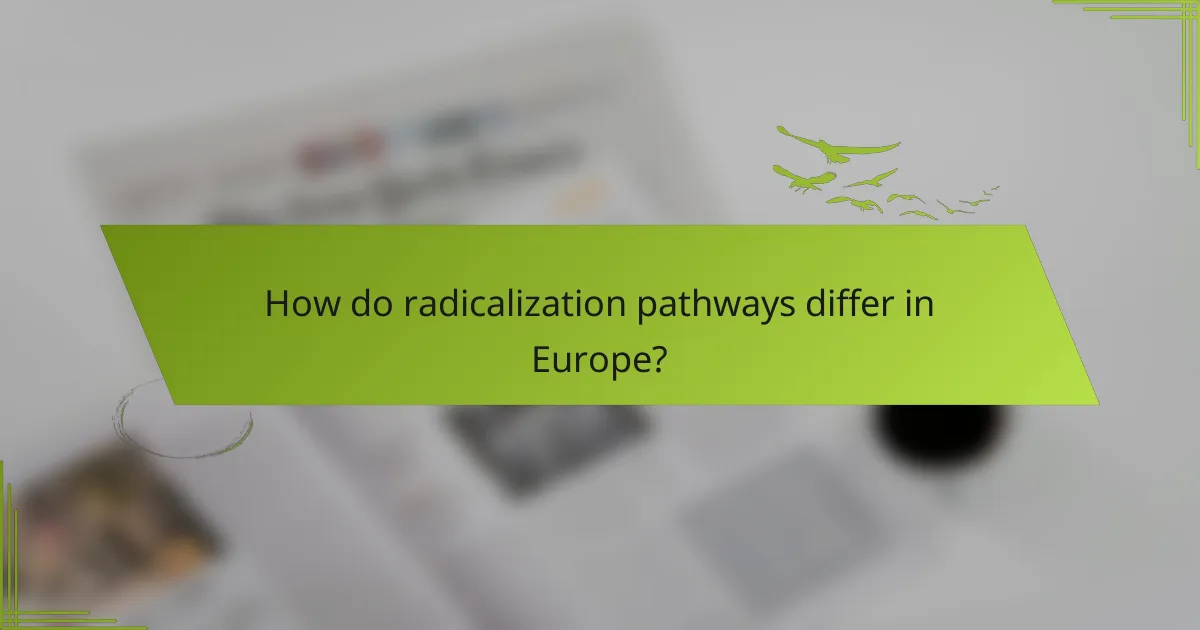This analysis explores the diverse pathways of radicalization across various countries, highlighting the unique social, political, and historical factors that contribute to the emergence of extremist beliefs. By comparing the United States and Europe, we can identify key influences such as community dynamics, immigration trends, and educational environments that shape individual experiences and responses to radical ideologies. Understanding these pathways is essential for developing targeted prevention strategies that address the root causes of radicalization.

What are the radicalization pathways in the United States?
Radicalization pathways in the United States typically involve a combination of social influences, community dynamics, and political ideologies that push individuals toward extremist beliefs. Understanding these pathways is crucial for developing effective prevention strategies.
Social media influence
Social media plays a significant role in radicalization by providing platforms for extremist content and fostering echo chambers. Individuals can easily find and connect with like-minded groups, which can amplify radical views and normalize extremist ideologies.
Algorithms on platforms like Facebook, Twitter, and YouTube often promote content that aligns with users’ existing beliefs, creating a feedback loop that can lead to deeper radicalization. Monitoring online interactions and promoting digital literacy are essential steps in countering this influence.
Community isolation
Community isolation can significantly contribute to radicalization, as individuals who feel disconnected from their surroundings may seek belonging in extremist groups. This isolation can stem from various factors, including socioeconomic status, discrimination, or lack of social support.
Efforts to integrate isolated individuals into their communities can reduce the risk of radicalization. Programs that promote community engagement and provide social services can help bridge these gaps and foster a sense of belonging.
Political extremism
Political extremism in the United States often manifests through polarized views and the rejection of democratic norms. Individuals may be drawn to extremist ideologies as a response to perceived threats against their identity or values, leading to radical beliefs and actions.
Addressing political extremism requires promoting dialogue and understanding across ideological divides. Encouraging civic education and participation in democratic processes can help mitigate the allure of extremist political narratives.

How do radicalization pathways differ in Europe?
Radicalization pathways in Europe vary significantly due to historical, social, and political contexts. Factors such as immigration trends, religious affiliations, and historical events shape how individuals become radicalized in different countries.
Historical context
Each European country has a unique historical backdrop that influences radicalization. For instance, nations with colonial histories may experience different dynamics compared to those with recent conflicts. Countries like France and the UK have faced challenges related to their colonial past, which can affect perceptions of identity and belonging among marginalized communities.
Additionally, the impact of World War II and the Cold War has left lasting effects on national narratives and social cohesion. These historical contexts can create environments where radical ideologies find fertile ground, particularly among disenfranchised groups.
Immigration factors
Immigration plays a crucial role in shaping radicalization pathways in Europe. Countries with high levels of immigration, such as Germany and Sweden, often see a mix of cultures that can lead to both integration and tension. The experiences of immigrants, including discrimination and economic challenges, can contribute to feelings of alienation and susceptibility to radical ideologies.
Moreover, the policies surrounding immigration and integration vary widely across Europe. Nations with inclusive policies may foster better social cohesion, while those with restrictive measures might inadvertently push marginalized groups toward radicalization.
Religious influences
Religion significantly impacts radicalization pathways, particularly in countries with substantial Muslim populations. In nations like Belgium and France, the interpretation of religious beliefs can lead to different radicalization trajectories. Extremist groups often exploit religious sentiments to recruit individuals who feel disconnected from mainstream society.
It’s important to note that the majority of religious individuals do not support radical ideologies. However, the presence of extremist narratives within certain communities can create an environment where radicalization becomes more likely, especially among youth seeking identity and purpose.

What role does education play in radicalization?
Education can significantly influence radicalization pathways by shaping individuals’ beliefs and critical thinking abilities. A well-structured educational environment can promote tolerance and understanding, while a lack of engagement or negative experiences may push individuals toward extremist ideologies.
Curriculum impact
The curriculum plays a crucial role in either mitigating or exacerbating radicalization. Educational content that emphasizes civic values, human rights, and cultural diversity can foster a sense of belonging and reduce susceptibility to extremist narratives. Conversely, curricula that neglect these themes or promote divisive ideologies may inadvertently contribute to radicalization.
For example, countries with inclusive educational policies often report lower rates of radicalization among youth. In contrast, regions where education is heavily influenced by sectarian or nationalistic ideologies may see higher instances of individuals gravitating toward extremist groups.
Critical thinking skills
Developing critical thinking skills is essential in combating radicalization. Education that encourages analytical thinking and questioning of sources helps individuals discern between credible information and extremist propaganda. This skill set empowers learners to challenge harmful narratives and resist radical influences.
Programs that incorporate debate, discussion, and problem-solving can enhance these skills. For instance, students who engage in critical analysis of current events are better equipped to understand the complexities of global issues, reducing the likelihood of adopting extremist viewpoints.

How can communities prevent radicalization?
Communities can prevent radicalization by fostering inclusive environments that promote dialogue and understanding. Engaging various stakeholders, including local leaders, educators, and families, is essential for creating a supportive atmosphere that counters extremist ideologies.
Community engagement programs
Community engagement programs focus on building relationships among diverse groups to enhance social cohesion. These initiatives often include workshops, cultural events, and collaborative projects that encourage participation from all community members.
Effective programs typically involve partnerships with schools, local organizations, and law enforcement to address grievances and provide support. For example, organizing youth mentorship schemes can help at-risk individuals feel valued and connected.
Counter-narrative initiatives
Counter-narrative initiatives aim to challenge and refute extremist messages by promoting alternative viewpoints. These programs often utilize social media campaigns, public speaking events, and educational resources to spread positive narratives that resonate with vulnerable populations.
Successful counter-narrative efforts require collaboration with credible voices within the community, such as former extremists or respected leaders. By sharing personal stories and factual information, these initiatives can effectively undermine the appeal of radical ideologies.

What are the psychological factors in radicalization?
The psychological factors in radicalization often involve complex emotional and cognitive processes that lead individuals to adopt extremist beliefs. Key elements include identity crises and a strong desire for belonging, which can drive individuals toward radical groups that promise acceptance and purpose.
Identity crisis
An identity crisis occurs when individuals struggle to define their sense of self, often due to social, cultural, or personal upheaval. This confusion can make them more susceptible to radical ideologies that offer clear narratives and a sense of belonging. For example, young adults facing societal pressures or discrimination may turn to extremist groups that validate their experiences and provide a new identity.
To address identity crises, it is crucial to foster environments where individuals can explore their identities safely. Support systems, such as community programs and counseling, can help mitigate feelings of isolation and confusion, reducing the appeal of radicalization.
Sense of belonging
A strong sense of belonging is a powerful motivator for individuals seeking connection and community. Radical groups often exploit this need by creating tight-knit communities that offer emotional support and shared purpose. This can be particularly appealing to those who feel marginalized or disconnected from mainstream society.
To counteract the allure of these groups, it is essential to promote inclusive communities that provide alternative avenues for belonging. Engaging individuals in positive social activities and fostering open dialogues can help satisfy their need for connection without resorting to extremist affiliations.

What are the implications of radicalization on national security?
Radicalization significantly threatens national security by fostering environments conducive to terrorism and violent extremism. It can lead to increased domestic and international threats, destabilizing communities and straining law enforcement resources.
Terrorism risks
Radicalization elevates the risk of terrorism by transforming individuals into potential threats who may engage in violent acts. These individuals often become part of networks that facilitate planning and execution of attacks, which can target civilians, infrastructure, or government entities.
Countries facing high levels of radicalization must consider the diverse motivations behind such behavior, including political, religious, or social grievances. Understanding these motivations helps in developing tailored counter-terrorism strategies that address root causes rather than just symptoms.
Effective countermeasures include community engagement and education initiatives aimed at preventing radicalization. Governments should focus on building resilience within communities to deter individuals from adopting extremist ideologies, which can significantly reduce terrorism risks.
